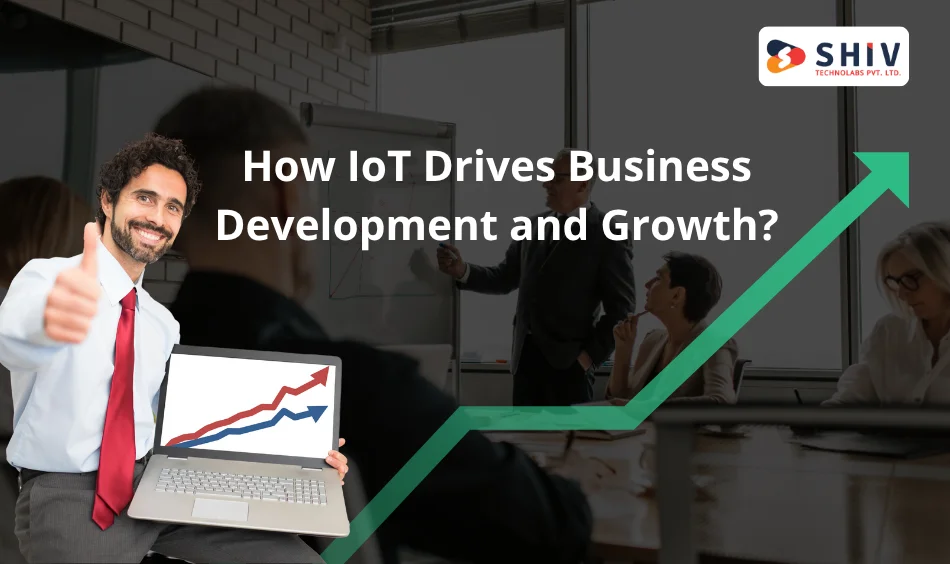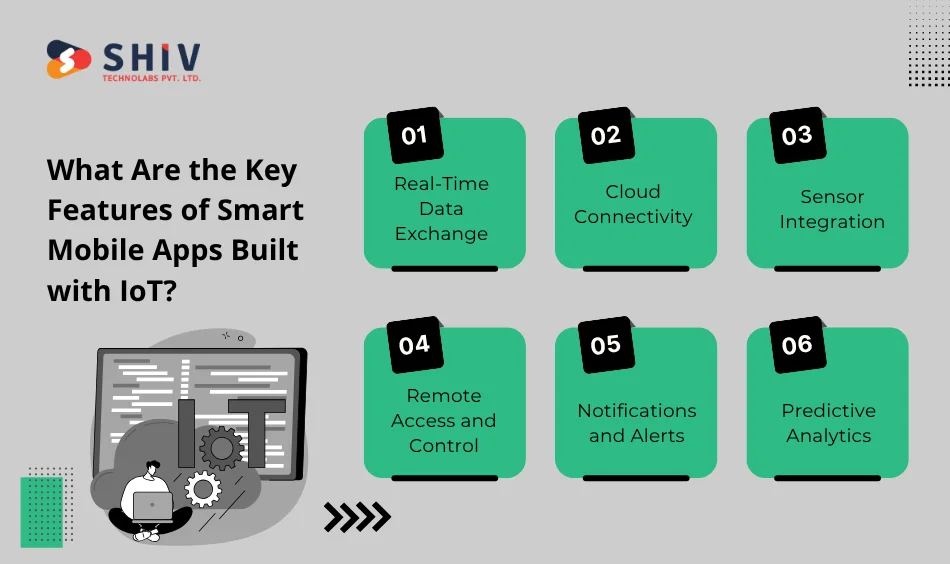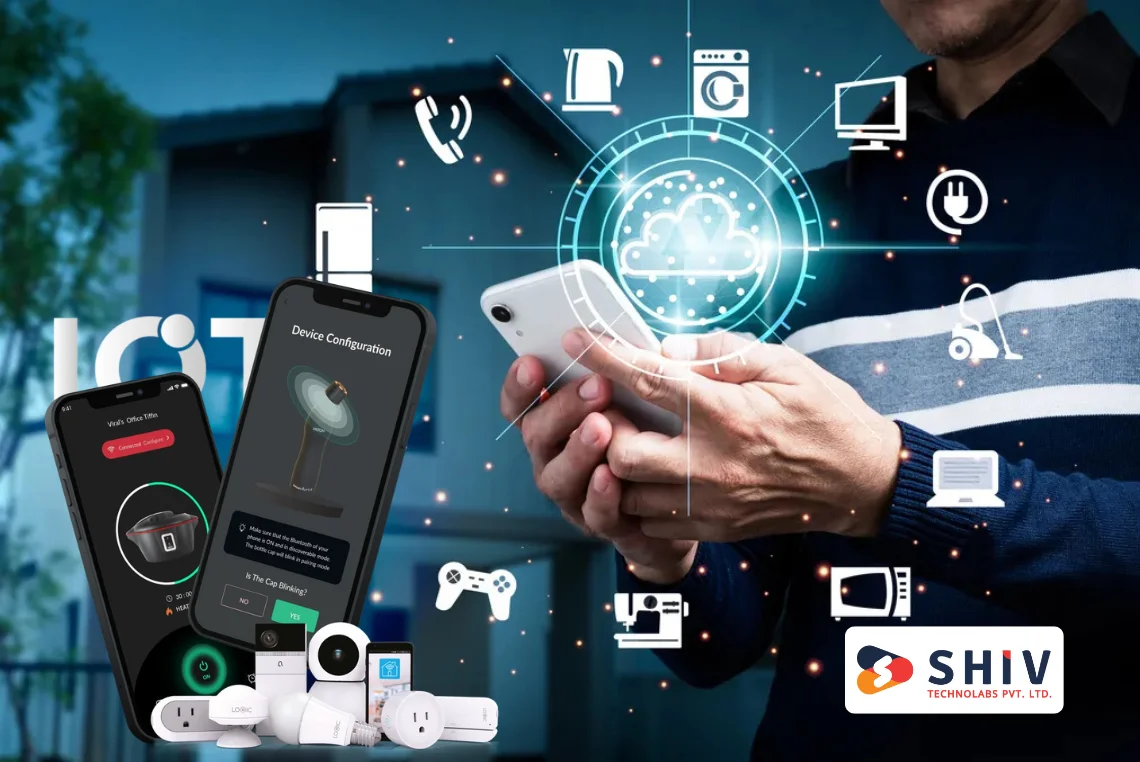Table of Contents
The Internet of Things has transformed standard business customer interactions, making regular mobile interactions smart and connected experiences.
Given the projected 21% increase in connected devices worldwide, businesses cannot afford to ignore the strength of IoT technology in influencing mobile interactions. [Data Source: Demand Sage]
By integrating personalized messages with real-time analytics, IoT enables brands to predict the needs of users, simplify operations, and provide unparalleled efficiency. At Shiv Technolabs, a leading IoT app development company, we develop connected solutions that make operations easier and provide smooth, smart user experiences.
The article will discuss how IoT technology in business can be used to boost mobile applications, enhance customer experiences, integrate with existing systems, and achieve quantifiable growth.
What Is IoT Technology and How Does It Improve Mobile Applications?
IoT technology is a network of intertwined devices connected to the internet that can collect, exchange, and analyze information. It may be integrated with mobile applications to make them smarter, faster and more personal.
How IoT can expand the efforts of the mobile applications:
- Automation: IoT applications would be able to automate everyday tasks, example, home lights, home appliances, or industrial machinery.
- Real-Time Monitoring: Mobile interfaces enable businesses to track the performance of devices, customer use at any point in time or inventory in real time.
- One-on-One Experiences: IoT-driven data can allow an application to deliver personalized recommendations, notifications, and services to individual users.
- Operational Insights: The mobile applications will have the capability to visualize and interpret complex IoT data and help managers make fast, informed decisions.
How IoT Drives Business Development and Growth?

The IoT business is not all about connecting devices. It empowers smarter operations, efficient decision-making making and customer engagement in industries.
Companies that incorporate IoT mobile apps have a chance to automate workflows, minimize operational expenses, and identify actionable insights based on real-time collected data.
# How IoT Mobile Applications Enhance User Experience?
The IoT mobile applications provide an interactive nature where the users get personalized, instant and contextual experiences.
User Benefits:
- Quicker Reactions: IoT-connected applications can react to user instructions and device notifications in real-time.
- Liverless Automation: Daily operations are handled automatically, which saves man-hours and effort.
- Smarter Insights: This provides suggestions to the user based on their behavioral and usage patterns.
- Proactive Alerts: Apps send alerts to users regarding an anomaly, maintenance, or update on the service.
Why Should Businesses Invest in IoT App Development?
IoT app development can enable businesses to reshape their organizational activities and approaches to customer interaction.
The ability to develop apps that communicate with devices, process real-time data, and offer personalized experiences is one way companies can gain a competitive advantage.
1. How Companies Use IoT to Improve Customer Experience
Companies are now implementing IoT to improve touch points and interaction:
- Smart Wearables: Fitness trackers and health monitors are devices that provide real-time updates and health insights.
- Connected Vehicles: Car makers provide applications that check the condition of the vehicle and recommend maintenance in advance.
- Smart Retail: IoT sensors on stores track inventory and suggest products to customers via mobile applications.
2. Benefits of IoT-Based Mobile Apps for Enterprises
- Predictive Maintenance: Early notification of problems in the device or machinery will save time.
- Reduction of operational costs: Automation and data-driven processes are time and resource-saving.
- Data-Driven Personalization: Apps provide an experience that is customized to specific users.
- Greater Productivity and Time-Saving: Real-time monitoring reduces the time to make a decision.
- Real-Time Analytics: Businesses get real-time data to improve their business strategy in a real time.
How to Integrate IoT with Existing Mobile Systems Effectively?
IoT cannot be implemented without extensive planning to ensure it works with the existing mobile infrastructure and remains scalable.
1. Identify Connectivity Goals
Determine what systems and devices should communicate. Provide clear data collection, automation, and analytics goals.
2. Choose Suitable IoT Platforms
Choose platforms that integrate across multiple devices and support cloud integration and analytics.
3. Build a Scalable Backend
Create a back-end that is capable of processing data from multiple devices without any performance problems.
4. Connect Devices and Sensors
Ensure smooth connectivity among IoT sensors, mobile applications, and cloud infrastructure.
5. Test, Secure, and Deploy
Properly test reliability, establish high security measures, and roll out the combined system in bits.
Common Challenges in IoT Integration and How to Overcome Them
Integrating IoT into mobile apps comes with its own set of hurdles. Awareness and proactive planning help overcome these challenges.
| Challenge | Description | Solution |
|---|---|---|
| Data Security | High risk of breaches | Use encryption, secure APIs, and regular audits |
| Device Compatibility | Different protocols and standards | Utilize IoT gateways and middleware |
| Connectivity | Network instability or downtime | Adopt hybrid cloud solutions and edge computing |
| Scalability | Handling increased devices and data | Build modular, scalable backend infrastructure |
| Data Management | Large volume of real-time data | Implement robust data storage and analytics tools |
Examples of IoT Mobile Apps in Business Success
The IoT mobile applications are driving success in industries characterized by efficiency, convenience, and enhanced customer engagement. Here are some of the real-world examples of IoT mobile apps in business:
- Healthcare: Remotely monitoring apps measure vital signs and notify the caregivers.
- Retail: Smart shelves keep track of inventory and recommend products through applications.
- Transportation: Vehicle tracking applications offer route optimization and predictive maintenance.
- Manufacturing: Predictive maintenance applications decrease downtimes and operational expenses.
What Are the Key Features of Smart Mobile Apps Built with IoT?

The development of smart mobile applications leverages various IoT features to deliver effective solutions.
Key Features:
- Real-Time Data Exchange: The devices exchange information in real-time.
- Cloud Connectivity: The data will be stored in a central place to be accessed across platforms.
- Sensor Integration: Sensors extract correct, actionable information of devices.
- Remote Access and Control: The users are allowed to monitor and control the devices remotely.
- Notifications and Alerts: Device users receive real-time notifications about the status of the device or any issues.
- Predictive Analytics: Applications use patterns to predict maintenance, preferences or trends.
Also Read: Cost to Build an IoT App
Technical Aspects to Consider Before IoT App Development
Understanding technical differences between traditional apps and IoT-based apps is crucial for successful deployment.
| Feature | Traditional App | IoT-Based App |
|---|---|---|
| Data Source | Manual input | Sensor-based, real-time |
| Connectivity | Limited | Multi-device integration |
| Analytics | Basic | Predictive and AI-driven |
How to Choose the Right IoT App Development Partner
It is essential to choose the right IoT App Development Partner for mobile applications so that your solutions become reliable, scalable, and secure.
Key Considerations:
- Successful IoT project portfolio in a variety of industries.
- Cloud / API integration skills.
- Open price and communication.
- 24/7 technical support
Shiv Technolabs is an experienced IoT solutions provider offering secure, data-driven mobile application solutions across all industries.
Conclusion
The IoT technology in business is changing the mobile experience, providing smarter, more responsive, and highly personalized applications. Companies that adopt the IoT will save money, enhance efficiency, and provide their users with unmatched experiences.
As one of the top IoT app development company, Shiv Technolabs assists businesses in developing custom IoT solutions to seamlessly connect devices, individuals, and data.
Contact us today to help create secure and scalable Smart mobile app development. Learn about our IoT development services to transform your operations and provide smart, connected experiences for your customers.
FAQs
Q1. How does IoT improve mobile app functionality?
IoT allows mobile applications to automate operations, manage equipment and devices, and gather real-time information. This makes it more responsive, actionable, and engaging to users.
Q2. What are the business benefits of using IoT in mobile apps?
IoT-based applications increase output and efficiency, decrease expenses, and enhance customer engagement by means of personalized engagements and live insights.
Q3. How can small businesses start adopting IoT technology?
They need to start with scaled devices, consider using cloud-based platforms, and resort to professional IoT application development to implement it easily.
Q4. Are IoT mobile applications secure for enterprise use?
Yes, IoT mobile apps ensure strong protection of an enterprise operation through encryption, secure APIs, frequent testing, and compliance mechanisms.
Q5. What influences the cost of the development of IoT apps?
The cost of development is based on the complexity of the app, the number of devices it will connect with, feature requirements, and the needs of the backend infrastructure.























